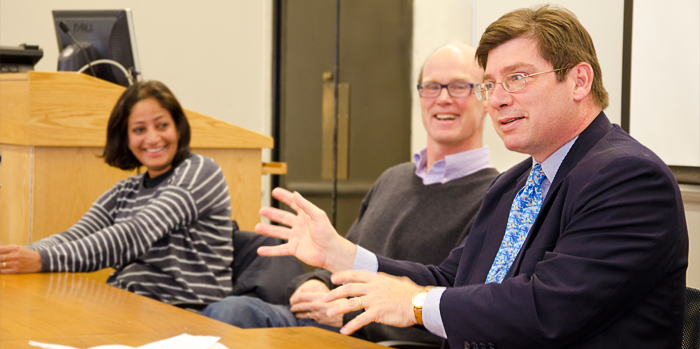
Prof. François Crépeau gave a lively talk on his scholarly work during the Faculty’s Research Week, along with Prof. Vrinda Narain (left), Prof. Shauna Van Praagh (not shown) and moderator, Prof. Stephen Smith (centre)
Law Research Week
In a new initiative from the Faculty’s Research Office, professors and students alike took part in a week of activities from February 27 – March 1 designed to highlight and celebrate research taking place at the Faculty of Law.
Two brown bag lunch sessions on Monday and Wednesday featured three speakers each: Professors René Provost, Pierre-Emmanuel Moyse and Hoi Kong, and Professors Vrinda Narain, François Crépeau and Shauna Van Praagh discussing their research interests. On both occasions, students filled classrooms to capacity to hear their professors talk about what it means to be legal academics and about the challenges and rewards of legal research.
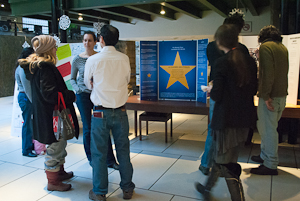 Graduate and postdoctoral students also set up posters presenting the subjects of their research in the Atrium and spent an afternoon on Monday answering questions about how they decided to take up their topics and what they hope to accomplish.
Graduate and postdoctoral students also set up posters presenting the subjects of their research in the Atrium and spent an afternoon on Monday answering questions about how they decided to take up their topics and what they hope to accomplish.
Mark Shepheard: The Law and Language of Water Stewardship: Rethinking Rights and Responsibility
Jiang Guan: What is the Responsibility to Protect (R2P)? The latest morph of the concept of humanitarian intervention
Maude Choko: La guerre des étoiles: Favoriser l’autonomie collective des travailleurs autonomes pour faciliter leur accès à un travail décent: une solution inspirée par les artistes du Québec
Luis Gomez Romero and Ian Dahlman: Justice Framed: Law in Comics and Graphic Novels
Kate Glover: Much Less and Much More: The Significance of the Supreme Court of Canada
Isabelle Deschamps: OHADA (L’Organisation pour l’harmonisation du droit des affaires en Afrique) Law Reform: Women entrepreneurs in Benin, Cameroon, Côte d’Ivoire and Mali
Faculty seminar event: Phenomena of Formalisation in European Law
– Vincent Forray, professor adjoint à la Faculté de droit
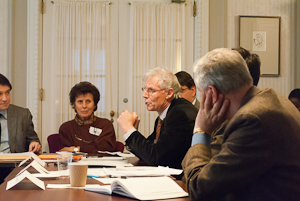 The seminar “Phenomena of formalisation in European Law” took place in the Faculty on Monday, February 20, with the generous support of the Faculty, the European Union Centre of Excellence, the journal Jurisprudence – Revue Critique and the research Group “European Private Law” of the University Santiago de Compostela. This day-long seminar was a great opportunity for scholars coming from six European countries to share their « internal » views on the topic with Canadian scholars (from Montreal, Sherbrooke and McGill Universities) who developed « external » approaches.
The seminar “Phenomena of formalisation in European Law” took place in the Faculty on Monday, February 20, with the generous support of the Faculty, the European Union Centre of Excellence, the journal Jurisprudence – Revue Critique and the research Group “European Private Law” of the University Santiago de Compostela. This day-long seminar was a great opportunity for scholars coming from six European countries to share their « internal » views on the topic with Canadian scholars (from Montreal, Sherbrooke and McGill Universities) who developed « external » approaches.
Les interventions et les discussions furent passionnantes – les silences, les non-dits et les impensés aussi.
Je dois dire que la réussite de la journée fut pour une part importante le fait des gens de McGill. Tous ceux-ci ont, à chaque occasion, approfondi les questions, alimenté les débats et rendu toute complaisance intellectuelle impossible. Adrian Popovici a été un président de séance enjoué et précis. Steve Smith a entrepris de prêter un corps à l’esprit de non-codification sur son panel. Patrick Glenn a su donner un relief hors du commun aux débats sur son panel ; et tout au long de la journée, ses remarques ont amené les participants à réagir et à penser (je songe en particulier, parmi ses nombreuses interventions, à ses propos sur la « résistance des formalisations »).
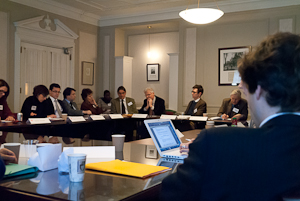
Ruth Sefton-Green, au travers d’une présentation percutante, nous a amené à considérer un droit européen des contrats toujours hanté par le spectre des codifications, derrière même des travaux académiques supposés ne pas codifier. Shauna Van Praagh a soutenu les discussions relatives à l’enseignement du droit européen par des interventions tout en finesse et en nuances. Elle a aussi su indiquer certains des présupposés qui traversent les discours sur le droit européen. Armand de Mestral nous a offert une passionnante mise en perspective de l’enseignement du droit européen à McGill. Il a également montré à quel point la circulation transatlantique des pensées sur les structures institutionnelles enrichit la compréhensions des parties prenantes (je songe plus spécialement à ses développements sur la notion d’uniformisation). Robert Leckey a captivé l’audience par un récit engagé de la journée au cours duquel il a, notamment, amené chacun à considérer ce que les débats lui avaient révélé sur soi.
Nous avons profité des remarques et questionnements de Lionel Smith. Ainsi que d’une invitation à la réflexion dialogique lancée par Jean-Guy Belley montrant que le droit européen pouvait être « l’autre » comme alternative plutôt que « l’autre » comme celui dont il faudrait gommer l’étrangeté.
J’ai été, quant à moi, saisi par la « présence » de la communauté intellectuelle de McGill. Pas un ensemble ou un système ; certainement pas une pensée. Plutôt ce que j’appellerai un style de la question, ou peut-être une esthétique du questionnement. Et pour aller plus loin : un genre de surréalisme juridique.
Je veux, pour finir, renouveler mes remerciements à tous ceux qui ont soutenu cette journée.
Celebrating the Peter MacKell Chair in Federalism
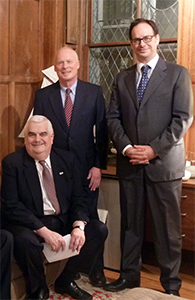 In February, Dean Daniel Jutras gathered at the Faculty with alumni and other members of the legal community to celebrate the creation of the Peter MacKell Chair in Federalism.
In February, Dean Daniel Jutras gathered at the Faculty with alumni and other members of the legal community to celebrate the creation of the Peter MacKell Chair in Federalism.
This position, for which the Faculty is currently considering candidates, will draw a scholar with a strong interdisciplinary background in law, political theory and public policy to McGill, to examine federalism as a mode of governance and social organization.
As Dean Jutras noted when the chair was announced in October 2011, “Peter MacKell recognized the promise that the Canadian constitutional order offers as a source of lessons to the world. He also recognized the Faculty’s historical strength in constitutional law, public international law and comparative law and the creation of this Chair will reaffirm the leading role played by McGill scholars in thinking broadly about federalism and public and private governance.”
Peter R.D. MacKell, QC, BCL’51, (1927-2011) was a distinguished alumnus of the Faculty of Law and former member of the Faculty’s Advisory Board.
Admissions and Recruitment visit to Kahnawake Mohawk Territory
An update from the undergraduate office of admissions:
In February, Acting Assistant Dean of Admissions and Recruitment Nicole Ginsberg joined colleagues from Medicine, Social Work, Enrolment Services and the Office of the Dean of Students (First Peoples’ House) for a visit to Kahnawake Mohawk Territory.
The visit, which brought representatives from McGill to speak about the university’s programs and admissions policies, sought to encourage students to consider pursuing their studies at McGill. The initiative is part of the ongoing efforts of the Faculty to reach out to local Aboriginal communities to create tangible links and encourage applications from community members and participation in our University community.
The most recent visit took place at Kateri Tekakwitha School in Kahnawake. Community members interested in attending McGill, whether for law, medicine, social work or other programs, had an opportunity to learn more about the programs and their respective admissions policies and practices.
The evening was coordinated by Kakwiranó:ron Cook of First People’s House and Chris Leclaire of Kahnawake Education Center, who began the evening by welcoming the participants and guest speakers. This was followed by an interactive discussion of admission to McGill and of University life for Aboriginal students. The participants then broke off into groups to discuss their areas of interest with the respective Faculty representatives.
The event was very warmly received by the approximately twenty-five participants, and further such events will be planned for the future.
